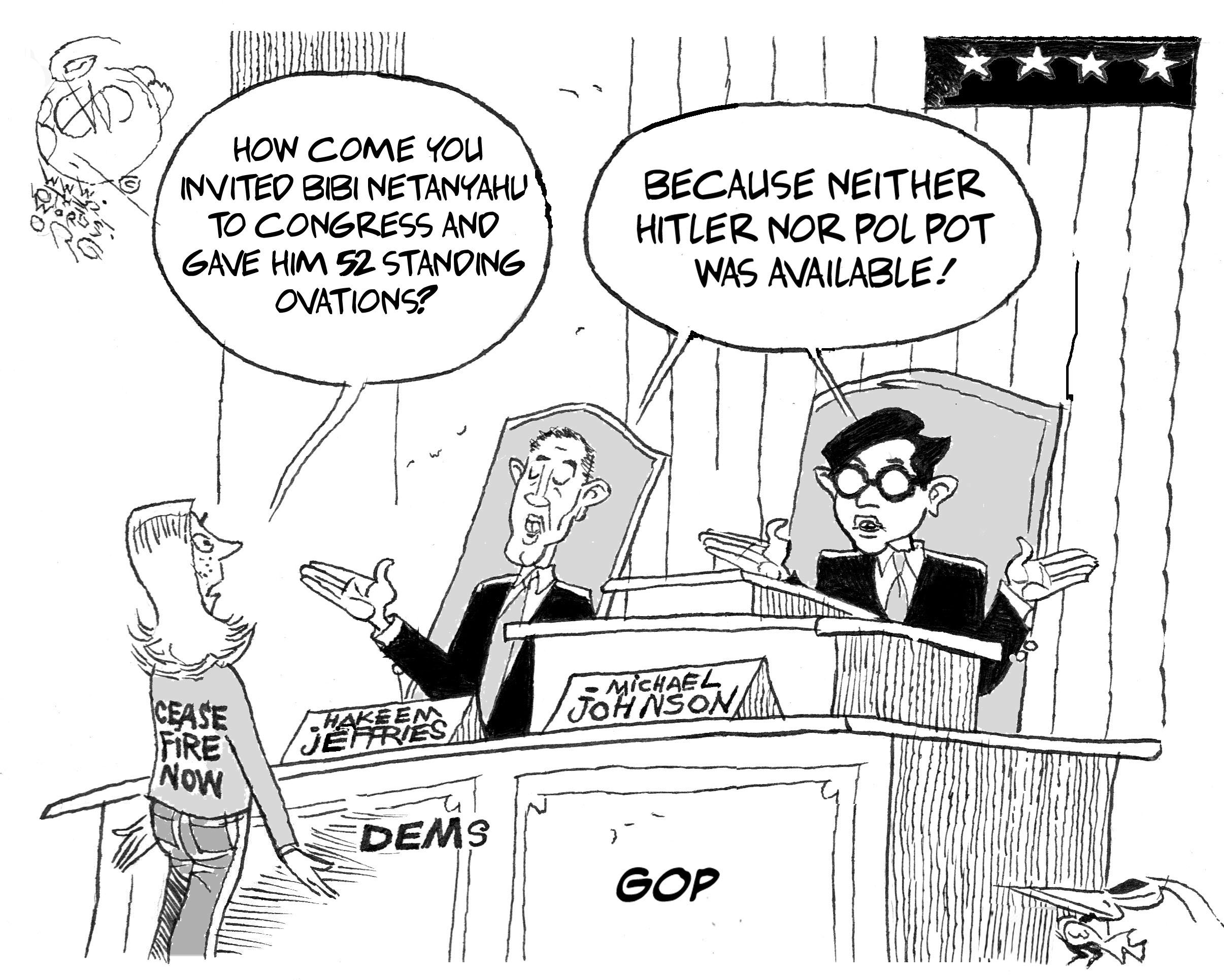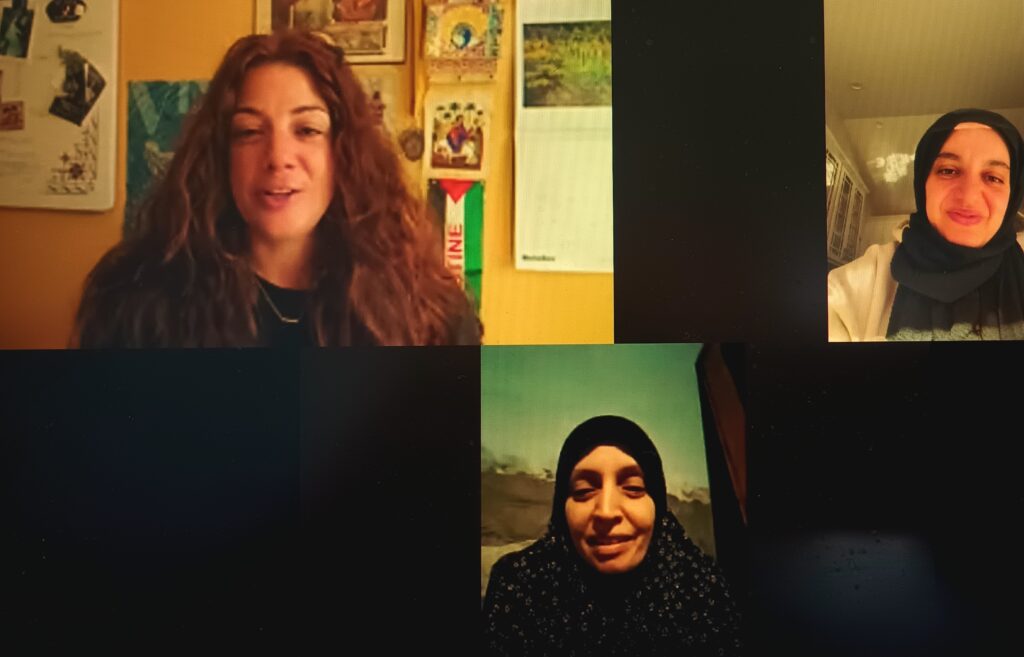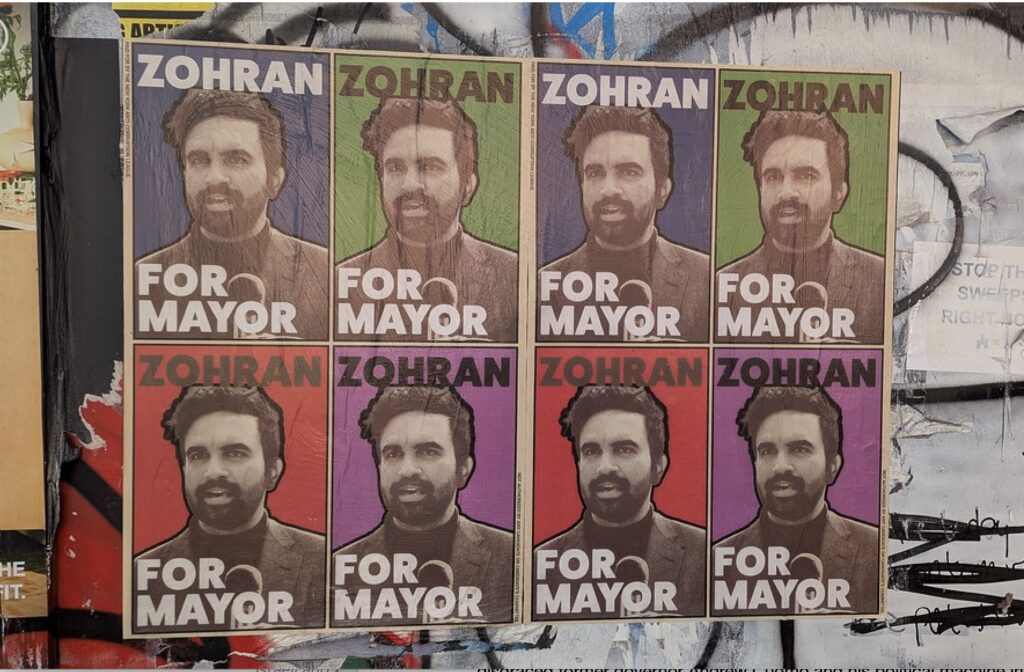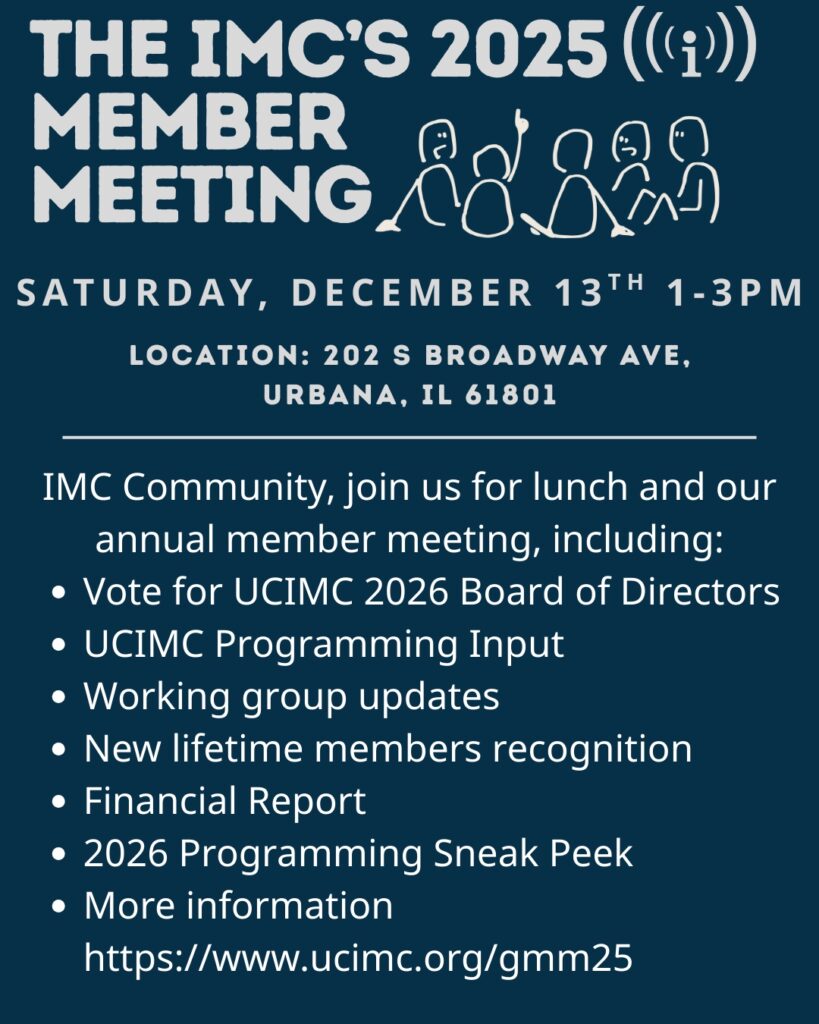
The Only War Criminal Available, cartoon by Khalil Bendib. Used under Creative Commons CC BY-ND 3.0 License

The Only War Criminal Available, cartoon by Khalil Bendib. Used under Creative Commons CC BY-ND 3.0 License

Graphic from visualizingpalestine.org. Used under Creative Commons BY-NC-ND 3.0 License
It’s been nearly four weeks since the start of “not a ceasefire” in Gaza. This “ceasefire,” like every previous one, means that Palestinians cease while Israel continues to fire, albeit at a slower pace—one more palatable to world leaders. Since the “ceasefire” came into effect, Israel has violated it hundreds of times, killing at least 230 Palestinians in Gaza as of this writing, including nearly 100 children. Israel has continued shooting Palestinians, and using tank shelling and even air strikes to target Palestinian men, women, and children, as well as their homes and hospitals.
These violations also include severely restricting the entry of aid and resources, with only about 10 percent of the “agreed-upon” trucks entering the strip, and the Rafah border remaining closed. Palestinians report a relative increase in the availability of high-calorie foods with low nutrient density, like chocolate and chips, rather than the needed life-saving nutrient-dense foods, sources of protein, and medication. One Palestinian reports it as “sugar everywhere, the illusion of nourishment, the mockery of life.” Continue reading

While we were hopeful that local, statewide, national, and international opposition to the war in Gaza and to the starvation of its citizens that resulted in the October 10, 2025 ceasefire would make peace, since then both sides have broken the deal and war continues to ravage an already decimated population. Because the firing has not ceased, and because peace was within reach, it is more important than ever that everyone be able to speak freely to achieve a calm resolution to an almost impossible impasse.
In Illinois, Governor Pritzker joined a wide swath of Democratic governors and lawmakers in insisting that aid be allowed to enter Gaza. World leaders increased their calls for peace. The United Nations has called on Israel to abide by UN rules and international law. And yet, at many universities, including the University of Illinois, Urbana-Champaign, criticizing Israeli policies is considered antisemitic.
We believe it is crucial that everyone, whether citizens or non-citizens, be allowed to voice opposition to deadly and genocidal policies. The pain of the families of the victims of Hamas’s October 7, 2023 attack is unimaginable and unambiguously horrendous. But starving children, some of whom were not even born when the attacks took place, will neither bring back the dead nor solve the political crises in the Middle East. What this mistreatment will surely do is create more anger and more terror, and make long-lasting peace an ever more distant mirage. These actions take us further from a future where everyone is able to live with freedom, safety, and self-determination. Continue reading

Screenshot of Zoom video by the author. Upper left: Jessica Clotfelter; upper right: Dua Aldasouqi; lower center: Asma
This is part one of a two-part article on friendship and solidarity during Israel’s war against Palestinians in Gaza.
Ear-to-ear smiles form on all three women’s faces when Asma appears on Zoom from 6,000 miles away in Khan Younis in the occupied Gaza Strip, Palestine. She and her family are still alive after more than 750 days of being bombed by Israel with weapons supplied by the United States. They are living in a crowded tent camp along the Mediterranean coast.
Asma waves at Jessica Clotfelter, a former Marine from Windsor, Illinois, who has just returned after being captured in October by the Israeli Defense Forces in the Mediterranean Sea, while trying to deliver humanitarian aid to Gaza by boat as part of the Global Sumud Flotilla. The boats did not reach Gaza. The closest vessel came within 25.5 nautical miles of its coast, but the mission helped amplify Palestinian voices for liberation. Continue reading

This article is adapted from Dr. Cha-Jua’s address “Stolen Labor, and Hindered Opportunity,” presented at the African Descent–Citizens Reparations Commission (ADCRC) public meeting on October 4 at the Krannert Center in Urbana. All of the presentations from that gathering are available on the ADCRC YouTube channel. You can get more information about local efforts towards correcting historic inequities by contacting cureparations@gmail.com. They have regular meetings at the New Covenant Fellowship in Champaign and are currently celebrating the reparations resolutions from both the Champaign County Board and Urbana City Council. These include $25,000 from each towards supporting various activities in support of reparations.
I explore here two distinct problems in the sociohistorical experience of the Afrikan American worker in Illinois. The first concerns the lived history of Black workers, their material conditions, work relations, and resistance to anti-Black racial oppression. The second is historiographic and examines the marginalization and distortion of Black workers’ experiences in the “Land of Lincoln.” Continue reading

Twenty-five years ago, Indymedia was born out of anti–World Trade Organization protests in Seattle in 1999. Using democratic media, volunteer journalists broadcast the voices from the global justice movement to millions of people around the globe.
Out of that realization of the power of independent media, a global network of 210 Independent Media Centers was born, including our own IMC. Since then, the media landscape has changed tremendously, but our IMC remains a paramount example of adaptability and resilience, evolving to meet the emerging needs of our community.
At the end of October, UCIMC celebrated 25 years with local members and collaborators from around the globe, including Japan, New York City, and Philadelphia. Continue reading

I recently quit using Spotify when I learned that its former CEO, Daniel Ek, had major investments in AI weapons manufacturing. As if I needed another reason, I later learned that the company had been streaming ICE recruitment ads.
If you’re also looking to cut ties to the corporate media machine while supporting independent artists, join me in tuning in to UC Independent Media Center’s own WRFU Radio Free Urbana 104.5 FM. In between shows, the station rotates an upbeat mix of local to global independent artists.
No tuner? No problem! Listen live or tune into past shows at wrfu.net. Continue reading

Charlie Kirk is dead. For some, that sentence alone stirs discomfort, because you’ve already been trained to mourn. But not all deaths are tragic. Sometimes people live in such a way that when they die, the earth exhales. Kirk was not misunderstood. He was not a patriot. He was not a martyr. He was a white nationalist, and I will not mourn him.
Chickens Coming Home to Roost
Malcolm X said it best when he remarked on “chickens coming home to roost.” He was vilified for telling the truth about consequence. I expect the same here. Kirk’s life work was built on stoking white nationalism, mocking Black liberation, demonizing immigrants, and targeting LGBTQIA people. He poured gasoline on fires of hate and called it free speech. His death is not loss, it is consequence. Chickens always come home to roost. You don’t get to plant seeds of hate and demand flowers of sympathy. Continue reading

The Pentagon doesn’t bother to substantiate the claims against its targets in the Caribbean, and boasts of the executions in international waters. Image from Defense Secretary Pete Hegseth’s X account
Trump notified the world of his intended campaign against “narco-terrorist cartels” on Inauguration Day, but the reality of this summer’s naval buildup and military strikes in the Caribbean still took Americans by surprise. Analysts have been working overtime to decipher White House intentions. Is this about the security of the Panama Canal? About redirecting Venezuela’s oil to reduce European vulnerability to Russia? About removing a regional ally of Cuba?
No, the logic of the War on Venezuela can’t be found in the normal geopolitical arguments, but it is literally staring us in the face. The coastal waters off Venezuela, where a US aircraft carrier, a guided missile destroyer, a floating Special Operations Command Center, and other warships have joined jets, drones, helicopter gunships, and thousands of US troops, is the stage for Trump’s most martial PR stunt yet. Venezuelan lives will get shattered in the process, but this isn’t about Venezuela or cartels at all. The brazen show that is Operation Southern Sphere is selling the US public a new kind of war here at home. Continue reading

“Zohran For Mayor,” by Eden, Janine and Jim, used under Creative Commons CC BY 2.0 License
New York did it. Its people elected Zohran Mamdani as mayor of America’s largest city. The 34-year-old democratic socialist, immigrant from Uganda, and two-term state assemblyman not only put the disgraced former governor Andrew Cuomo and his political machine into the dustbin of history, he beat the billionaires in American capitalism’s headquarters.
When Mamdani launched his campaign in late 2024, he was considered a long shot. Few knew him, and the few power brokers who did dismissed him. Mamdani suffered through tired, lazy smears which the ruling class relentlessly throw at socialists: “unrealistic this,” “impossible that,” you know the lines.
Despite the long odds, he now sits atop one of the highest offices in the country. As mayor of New York City, he will manage a budget of more than $119 billion and a staff of 280,000-plus, and serve 8.4 million people. Socialism won, and it won big. Continue reading


Democracy Now, August 13, democracynow.org

Civilian destruction in Tehran from the recent bombings; almost 1000 Iranians were killed, nearly all of them civilians with no connection to Iran’s nuclear program. Photo by Calla Walsh, used with permission
On June 21, 2025, “pro-peace” President Donald Trump announced to the world that the United States had (illegally) bombed Iran. After decades of bloodlust, Israel had finally gotten the war in Iran that it desperately craved.
Israeli prime minister and the butcher of Palestine, Benjamin Netanyahu, attacked Iran without any legal or moral basis. Israel’s violence against Iran, which eventually grew into the “Twelve-Day War,” was surely conducted with America’s permission, if not direct coordination. Israel would not dare cross its political master, the world’s leading supplier of weapons and political aid to the apartheid state in the Middle East. Continue reading

Ms Rachel with Rahaf, a three-year-old war amputee in the US for medical treatment. Image from Democracy Now, August 13, democracynow.org
Ms. Rachel, as she’s known to many, is the stage name of Rachel Griffin-Accurso, part of a new generation of children’s educational programming creators that have moved off of television and onto streaming services. Stars like Blippi and shows like Cocomelon appeal to children who haven’t entered school yet, and these shows appear to have wide interest as streaming services like YouTube continue to reshape the media landscape. Griffin-Accurso’s rise has led to a deal with Netflix to license her YouTube channel “Songs For Littles” as a “curated compilation” of her videos, according to Business Insider. Her story is however much more humble. As a music teacher and early childhood educator Griffin-Accurso had turned to YouTube as a home in 2019. Six years later, as of August, 2025, she has 16.5 million YouTube subscribers (which nets her an estimated monthly earnings of $99,000 to $1.6 million, according to social media tracking website Socialblade).
A notable part of Ms. Rachel story’s is that Griffin-Accurso’s videos focus on supporting language learning with children by employing songs and sign language. According to a Washington Post profile, when Griffin-Accurso’s son was diagnosed with a speech delay she decided to make the quality content that she felt lacking in children’s media. The early videos have a very clear “do-it-yourself” aesthetic, with flat digital backgrounds and animations, stains on the performer’s shirts, and bad hangnails in closeups. This is in part because Griffin-Accurso has a unique story about how her videos and channel took off during the 2020 COVID lockdown. A recent Post article on YouTube content creators explains that while early videos were simple, she now has a professional team that helps give the show polish. Newer episodes (like the potty-training special from May) have fully choreographed songs, full sets, and new cameras. These are the kinds of productions that helped her secure collaborations with Sesame Street’s Children’s Television Workshop and Australian children’s music group The Wiggles. Continue reading

Dueling Definitions of Antisemitism
Consider two definitions of antisemitism. The first holds that antisemitism refers to hostility, prejudice, or discrimination against individual Jews. It can be manifested in various forms, including negative stereotypes, violence, and social exclusion. The second holds that antisemitism is hostility against the Jewish people. Are these two definitions the same thing, or are they different? What are their implications for understanding the relationship between anti-Israeli and antisemitic sentiment? Is one definition preferable to the other?
These are not merely academic questions. Students have been arrested and expelled from universities, faculty have been fired, university presidents have been forced to resign, and citizens have been denied due process as a result of the way antisemitism is defined. In this essay I will show why the first definition is to be preferred to the second. Continue reading

A sketch by participant Anastasya Elissevah from Ken’s August 2 Cape Town workshop to produce a manifesto for a just city with urban movements occupying abandoned buildings and land there
This article is a distillation of a recent conversation with UIUC-based urban justice educator Ken Salo and his Cape Town, South Africa-based comrade Bevil Lucas by the Public i’s Rick Esbenshade. Ken and Bevil are veterans of the 1976 student- and worker-led struggles against white-monopoly capitalism in apartheid South Africa, and now work with movements of the urban poor resisting displacement and dispossession by black-elite-managed neoliberal capitalism in South Africa. Their current collaboration centers on an intergenerational political educational project, the Humane Urbanisms Project, that aims for working-class activists to situate their daily struggles for dignified livelihoods and decent housing as rooted in earlier struggles against politically and economically polarizing and privatizing Cape Town. Their collaboration works to uncover and amplify the resistance stories of movements occupying vacant public land and abandoned buildings as strategies for survival and dignified urban livelihoods. Their Cape Town project is a local node within a larger transnational network of land and housing justice collectives in the Global South that includes the Landless Workers’ Movement in Brazil and our local FirstFollowers reentry project. Bevil also works with Reclaim the City to build city-wide connections with shack dwellers, as in the Intlungu YaseMatyotyombeni Movement, via shared projects to address gender-based violence, childcare, after-school homework support, gardening and food sovereignty, building cooperative movements, and “every aspect of people’s lives.” These projects allow Bevil to repurpose skills learned as an advocate for workers’ rights in international trade union networks like the International Labour Research and Information Group. Similarly, they allow Ken opportunities to repurpose skills honed as a veteran [Brazilian educational philosopher] Paolo Freire-inspired political educator working to recover the humanizing and emancipatory epistemologies of the urban oppressed in the Global South. Continue reading

GEO organizers promote the RA unionization drive. Photo by Sandra Voskoboynikova, used by permission
The research assistants (RAs) at the University of Illinois Urbana-Champaign have officially joined GEO, the Graduate Educators Organization (GEO Local 6300 IFT/AFT AFL-CIO) at UIUC. The organization now represents teaching assistants (TAs), graduate assistants (GAs), pre-professional graduate assistants (PGAs), and RAs on the UIUC campus.
On May 15, 2025, RAs submitted their formal unionization interest petition to the GEO, the culmination of a campaign that began in September, 2024. On July 10 they held their official election and voted “yes” for union representation by an overwhelming majority—over 95 percent asked to be included in the membership of the GEO at Illinois. On July 22, the Illinois Labor Relations Board officially recognized GEO as the representative for RAs at the university. This was a history-making effort that represents both the first successful effort to unionize RAs at the university and the cementing of GEO’s efforts to represent all graduate employees. Following the successful election, the GEO has officially become one of the largest unions of higher education employees on a single campus in the country, and is now the state of Illinois’s second-largest educators’ union. Continue reading

Potter’s field in Eagle Pass for unidentified bodies found along the border area. Photo courtesy of Witness at the Border delegation, March, 2025
This past spring I traveled with Witness at the Border to the border town of Eagle Pass, TX. I wanted to take a firsthand look at ground zero of the latest domestic militarization project dressed up as a national security measure. Eagle Pass had been in the national headlines since December, 2023, when a local group erected a field of crosses to represent the 700 lives lost that year due to increasingly lethal border barriers. One month later Republican Texas Governor Greg Abbott flipped the script and sent the Texas National Guard to occupy the city’s riverfront park and protect Texans from an “immigrant criminal invasion.” It was a direct challenge not only to local efforts to humanize the global immigrant crisis, but to the Biden administration. Abbott’s charge that the President had failed to safeguard the nation made for good election-year headlines, and the scaremongering fed into Republican anti-immigrant bombast throughout the 2024 election season. And Abbott’s National Guard deployment has now been imitated by Trump in Los Angeles, CA and Washington, DC.
When I arrived at Eagle Pass in March I expected to find the river with its barbed-wire-coil shoreline, the cemeteries for the unidentified whose bodies had failed them in the arid scrubland or the river, the infamous Wall, and the general air of military occupation—but what I didn’t expect were the Kickapoo. Ultimately it was the sign for the Kickapoo Lucky Eagle Casino on the outskirts of Eagle Pass that led me to rethink the place of the current war on immigrants in US and global history. Continue reading

This essay is adapted from and expands on an earlier article by the same title published in the Fall 2024 issue of Justice Rising.
Media lie at the heart of many crises facing us today, from the rise of fascism to growing inequality to the ever-worsening climate crisis. Increasing numbers of people intuitively understand that our media institutions are failing democracy. This critical awareness can help create opportunities for structural reform. But too often our indictments focus on individuals—corporations and media owners—who consistently allow profit to trump democracy. This criticism is justified and necessary—after all, media and tech oligarchs are a key part of the problem. But it’s insufficient if our goal is to fundamentally change our media at a structural level.
To build the media we need will require a more systemic critique, one that acknowledges that capitalist logics—profit imperatives that exclude entire communities, extract our attention and personal information, and censor our news media—are at the root of the problems we are dealing with today. From news deserts to digital redlining, run-amok commercialism is a major cause of what ails our information and communication infrastructures. The market’s hidden hand is driving journalism into the ground and amplifying all manner of mis/disinformation throughout our media systems. Continue reading

Champaign Police Officer Nicholas Krippel stands closely behind a man, who later filed a complaint against him for being threatening and discourteous.
Screenshot from Champaign Police Department bodycam footage
This story was originally published by Invisible Institute and IPM Newsroom on May 12. It has been edited for length and style. A full version, as well as more about the history and present of the Champaign Citizen Review Subcommittee, can be found here.
In 2021, shortly after she became the chair of Champaign’s civilian police review board, Alexandra Harmon-Threatt sat down to review records from investigations into civilian complaints that had been filed earlier that year.
In one case, a man had accused Champaign Police Officer Nicholas Krippel of being physically and verbally aggressive toward him and making physical contact without cause during a response to a verbal disagreement.
“Officer Krippel got in my face, in my space,” the complainant said. “His vest actually touched my skin, that’s how close he was to me.”
The man said Krippel had escalated the situation: “He only told me to stop talking and shut up, but he [said] nothing to the dude that threatened me.”
Harmon-Threatt’s review of bodycam video confirmed, in her mind, that both of these allegations had merit. But when she read Champaign Police Department (CPD)’s report, she found that it contradicted the evidence. Continue reading